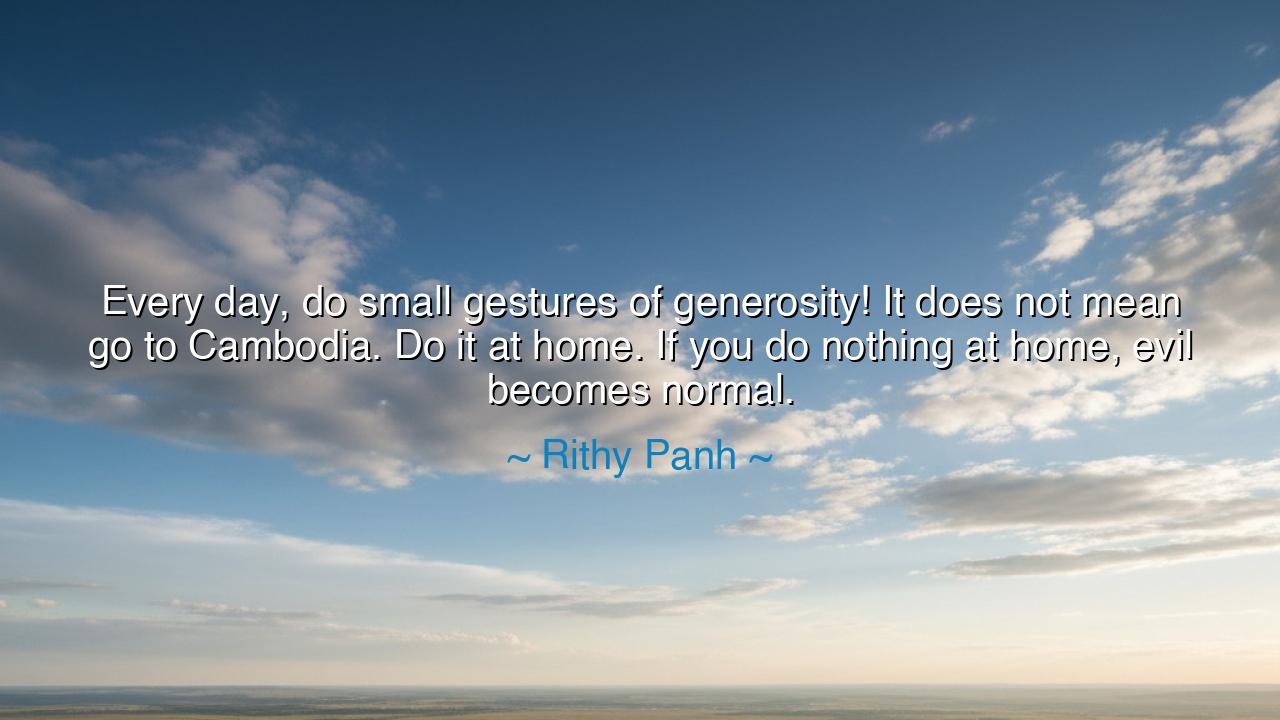
Every day, do small gestures of generosity! It does not mean go
Every day, do small gestures of generosity! It does not mean go to Cambodia. Do it at home. If you do nothing at home, evil becomes normal.






“Every day, do small gestures of generosity! It does not mean go to Cambodia. Do it at home. If you do nothing at home, evil becomes normal.” Thus spoke Rithy Panh, the Cambodian filmmaker and survivor of unspeakable horror, who carries within his words the wisdom of one who has seen the world both at its cruelest and at its most compassionate. His voice, forged in the ashes of genocide, does not cry for grand acts of heroism, but for the quiet, steady work of goodness — the daily choices that keep the human soul from decay. His teaching is simple yet profound: that evil thrives not from the strength of the wicked, but from the silence of the ordinary.
When Panh speaks of “small gestures of generosity,” he reminds us that virtue does not always wear the crown of martyrdom. True goodness is humble, often unseen — a smile to a stranger, a hand extended to one who falters, a word spoken in defense of truth when it is most inconvenient. These gestures are the seeds of civilization itself. For when we neglect such acts, the soil of the world grows barren, and evil becomes normal, creeping quietly into our homes, our hearts, and our nations. His warning is not merely poetic; it is prophetic.
To understand his words, one must know his life. Rithy Panh survived the terror of the Khmer Rouge, a regime that turned neighbor against neighbor and made cruelty routine. In the camps, compassion was forbidden, and to show pity was to risk death. Yet, even in that darkness, small gestures — a piece of rice shared, a whispered word of comfort — became acts of resistance. They were sparks of light in a night that seemed endless. When Panh tells us to be generous “at home,” he speaks as one who has seen what happens when people wait for others to act, when they believe that goodness belongs to saints or to those far away. Evil, he warns, does not demand our hatred — only our indifference.
The ancients, too, knew this truth. In the dialogues of Plato, it is written that the decline of a city begins not with the malice of tyrants, but with the apathy of citizens who cease to care for one another. And in the parables of old, the gods favored not the warrior or the king, but the humble soul who gave water to the thirsty or bread to the hungry. Generosity, the ancients taught, is the lifeblood of a just world. To neglect it, even in small ways, is to invite disorder into the heart of society.
Consider the story of Oskar Schindler, a man who began his life as an opportunist and profiteer but found his humanity in the midst of destruction. In the shadow of the Holocaust, he did not end the war nor overthrow tyranny — but he saved one life, then another, and another still. His actions were not loud or grand, but they were consistent, rooted in a simple truth: that to save even one soul is to defy evil itself. Panh’s teaching flows from the same river — that moral strength is not built in distant crusades, but in the courage to act with kindness here and now.
Yet, in our age, many believe that to do good is to do something spectacular — to travel, to donate vast sums, to build monuments of virtue. Rithy Panh rebukes this illusion with wisdom and grace. “It does not mean go to Cambodia. Do it at home.” The meaning is clear: do not wait for distant causes to awaken your conscience. Begin where you stand. Feed the hungry soul beside you; speak gently to those who struggle near you. The world does not need more spectators of compassion — it needs practitioners of it. For goodness, like evil, grows through habit.
So, my children, take heed of Rithy Panh’s call. Do not let the darkness of the world overwhelm you into silence. Remember that a single flame can defy an entire night, and that your smallest act of kindness may ripple farther than you can imagine. Let your home be your first kingdom of virtue; let your words and deeds be the guardians that keep apathy at bay.
For the lesson is eternal: if you do nothing, evil becomes normal. The decay of the world begins not with monsters, but with those who look away. Therefore, rise each day and do one small act of light — for others, for yourself, for the world. Sweep away indifference with kindness. Heal division with generosity. And when the night seems deepest, remember that even the smallest spark, tended faithfully, can ignite the dawn.






AAdministratorAdministrator
Welcome, honored guests. Please leave a comment, we will respond soon